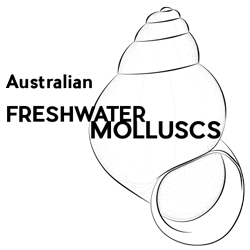
This species belongs to the Austropyrgus cooma group, whose members are characterised by generally pupiform to conical, small to medium-sized shells, where the last whorl and base are evenly convex.
This is one of several species of Austropyrgus found in the southern half of New South Wales. They are all very similar, separated only by small differences in size and shape of the shells and in anatomical details. They have elongate-conic shells, where adults possess a slightly thickened aperture, and the operculum bears several pegs. Most species of Austropyrgus are geographically isolated and have restricted ranges. This species is found in the vicinity of Cooma.
Austropyrgus cooma (Iredale, 1943)
Class Gastropoda
Infraclass Caenogastropoda
Order Littorinida
Suborder Rissoidina
Superfamily Truncatelloidea
Family Tateidae
Genus Austropyrgus Cotton, 1942
Original name: Pupiphryx cooma Iredale, 1943. In Iredale, T. (1943). A basic list of the freshwater Mollusca of Australia. Australian Zoologist 10: 188-230.
Type locality: Cooma, NSW.
In small streams on water weeds, hard substrata (rocks etc.) and crawling on litter and sediment. Can be locally abundant. Assumed to feed by scraping bacteria and microalgae. Lay solitary capsules containing a single egg. Direct development.
In the small streams and marshes around Cooma, New South Wales.
Most species of Austropyrgus are geographically isolated and have restricted ranges, and this one is no exception.
Bradley (1926) provided drawings of the shell and head-foot of this species.
Bradley, B. (1926). Observations on the water snails of Monaro and New England, New South Wales, with special reference to their cercaria carrying capacity. Medical Journal of Australia 1, 147-159.
Clark, S. A., Miller, A. C. & Ponder, W. F. (2003). Revision of the snail genus Austropyrgus (Gastropoda: Hydrobiidae): a morphostatic radiation of freshwater gastropods in southeastern Australia. Records of the Australian Museum 28: 1–109.
Iredale, T. (1943a). A basic list of the fresh water Mollusca of Australia. Australian Zoologist 10: 188-230.